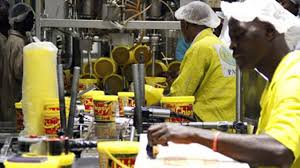The Manufacturers Association of Nigeria (MAN) has raised concerns over a 12.9% rise in unsold goods, with inventories climbing from N1.24tn in mid-2024 to a record N1.4tn by the year’s end.
Speaking at the 2025 Presidential Media Luncheon in Lagos on Wednesday, MAN President Francis Meshioye attributed the surge in unsold inventory to declining consumer purchasing power, worsened by soaring inflation, currency devaluation, and high operating costs.
“The manufacturing sector in 2024 faced a myriad of macroeconomic and infrastructural challenges that severely impacted its performance,” Meshioye explained. Inflation surged to 34.6% in November 2024, diminishing demand for manufactured goods and leaving goods unsold across industries.
*Economic Pressures Hit Manufacturers Hard*
Meshioye detailed the adverse effects of the naira’s devaluation, which plummeted from N666/$ in mid-2023 to over N1,700/$ by mid-2024. This significantly increased costs for imported raw materials and machinery, further eroding manufacturers’ profitability.
Additionally, interest rates peaked at 27.7% by November 2024, limiting manufacturers’ ability to access credit for expansion. Operating costs skyrocketed as electricity tariffs increased by 250% in 2024, forcing many businesses to turn to expensive alternative energy sources.
The sector’s contribution to Nigeria’s GDP declined as a result, falling from 16.04% in Q4 2023 to 12.68% in Q2 2024.
*Calls for Government Intervention*
“Manufacturing is pivotal to galvanizing and sustaining the economic growth and development of Nigeria,” Meshioye stressed, urging the government to prioritize the sector’s recovery.
Key recommendations included:
– *Tax reforms*: The swift passage of four tax bills currently before the National Assembly.
– *Electricity tariffs*: A review to ease operating costs.
– *Forex backlogs*: Prompt clearance to alleviate pressure on manufacturers.
– *Infrastructure improvements*: Addressing deficits to boost productivity.
Meshioye also emphasized the need to curb inflation, address policy inconsistencies, and adopt modern technologies like artificial intelligence to enhance production efficiency and capacity utilization.
*Looking Ahead*
Despite the challenges, Meshioye expressed cautious optimism about the sector’s future, pointing to a projected 4% economic growth in 2025 and a potential stabilization of the naira between N1,500 and N1,650 to the dollar.
“The path to growth is clear,” he concluded. “Improving productivity and enhancing competitiveness must remain priorities to ensure Nigerian manufacturers navigate these challenges successfully.”
MAN’s latest report underscored the impact of inflation, subsidy removal, and naira devaluation on the sector, which saw a staggering 357.57% increase in unsold inventories in the first half of 2024. The association reiterated its call for urgent reforms to stabilize the manufacturing industry and the wider economy.

